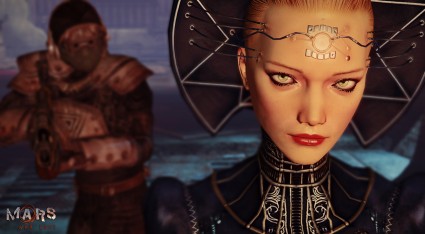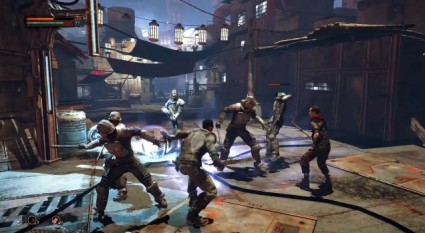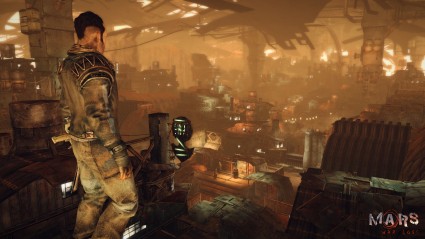Reviews
Mars: War Logs
May 18, 2013, Author: Trent Pyro
Considering it’s just a little planet floating quite near us, Mars has long been the subject of fiction. In games, we’ve had the good (Red Faction), the bad (Big Red Racing) and the downright arse-ugly (Martian Gothic: Unification). To be honest, our beloved Red Planet has often been treated as a ‘cool’ and ‘sci-fi’ setting for utter and complete shit.
Seemingly aiming to break that stigma is fledgling indie developer Spiders. Previously focusing on porting games and assisting other studios, Mars: War Logs is their first foray into the world of sci-fi action-RPGs. It’s available for a budget price, but does that mean budget quality? Well, not entirely…
Someone’s poisoned the water hole!
The background behind M:WL‘s shaky plot reads like a GCSE Creative Fiction piece, albeit a decent one. Mars was colonised and terraformed, with the colonists living in luxury and beauty on the new planet. For a while, anyway. At some point Mars tilts on its axis and everything goes tits-up. In the ‘Turmoil’ that followed, water companies took power and by the time the game kicks off there are four water guilds wrestling for control of the planet’s surface. As back-stories go it’s not bad, but little explanation is given for many of the cataclysmic events that put the planet into such a shit state of affairs.
You play Roy Temperance (I’ll get to his daft name in a bit), a prisoner of the latest war between his guild, Aurora, and the biggest and hardest one, Abundance. Thrown in a POW camp with no end in sight, he decides to break out. This forms the first third of the game’s shortish lifespan and is probably the most effective section. Once you escape the confines of the camp it all gets a bit vague and ghostly, with strong twists and plot nodes in short supply.
Everyone from Aurora has a ridiculous name. Temperance is Roy’s proper name and I can’t blame him for wanting to change it. Solidarity, Charity, Innocence; pretty much every virtuous word is used but even then it’s pretty unbelievable that there wouldn’t be a million Solidaritys or Defiances wondering about outside of the camp.
The Abundancites (?) have normal names, except they’re too normal. The scary, cold and Wesker-esque Technomancer who runs the camp with an iron first? Sean. The guard who’s nice to you and wants to help you escape? Bob. I can understand Spiders wanting to break the mold of futuristic names, but instead of settling with a neat balance or original concept they seem to have gone with both sides of the silly spectrum. It’s difficult to respect the toughness of a guy called Temperance, or shit bricks when a guy named Sean pops up.

Forgive me if I’m not quaking in fear at your name, Mary…
While most of the characters are written well enough, it’s almost like the writers were told to pen way too much dialogue. What a character doesn’t say can be as important as what he does and M:WL‘s rambling NPCs certainly don’t understand that. The rare short and sharp exchanges border on Witcher 2 levels of wit and quality, but then another bunch of silly ramblers come along and spoil it all. A little more editing and proofing would’ve worked wonders here.
While the main plot quests make sense, almost every side quest is a case of finding a certain amount of something or backtracking to ferry items around. The former type are instantly irritating as there’s no indication where to find said things, and you end up treading old ground desperately looking for a shiny ‘you can loot here’ area. The latter are about as enjoyable as fetch-quests can be. Some creativity here could have solved the issue but it seems all the focus was put on the main quest and that side-quests were handled by the intern.
I have a broken light fixture… fear me!
Combat is probably the best element of M:WL and thankfully makes up a hefty percentage. Oddly for a sci-fi game it’s almost entirely melee-based, making it feel more Fable than Mass Effect. It’s refreshing and works relatively well. Unusually for a PC-only game, it has clearly been designed for the Xbox 360 controller and has a HUD to compensate. I can’t imagine how awkward it would be with a keyboard and mouse, and this fact will likely irritate PC purists.
Basic attacks are broken up with guard breaks, blocks and dodges. You’ll have to use all your moves to get through the grueling battles that permeate the initial few hours. You’re regularly outnumbered by enemies that are faster, stronger and tougher than you and it feels like you’re being cheated. It’s too easy to get surrounded and stuck in a loop of stunning, helplessly getting batted between foes like a human tennis ball. I felt as is if I was being forced to pour all my upgrade points into increasing my health and damage just so I could survive the next section.
Luckily this difficulty plains out once you leave the camp, and although you still need to be on your toes, the opening up of other skills makes it much more fun. As you level up you can upgrade three trees; combat, stealth and technomancy. The latter is M:WL‘s version of magic, encompassing four electricity-based abilities. A shockwave helps push back foes, a lighting bolt stuns, a shield protects you for a bit and a weapon-charge ability adds stunning to every strike. While not very inventive, they end up being useful most of the time.
These abilities, as well as additional secondary weapons and items, can be used from the tactical menu with a tap of LB and assigned to the remaining shoulder buttons for battle. You can also command party members from here and it slows the action to a crawl to give you time to think.

Talk about bringing your mates…
Stealth, however, is a joke. You’ll rarely come upon a layout of enemies you can realistically skirt around and pick off. Most attempts at sneaking end when you whack the first guard, instantly alerting all his mates. Leveling up the stealth tree just makes things more ridiculous, almost to the point where you can crouch in front of a patrol and still not be seen, simply because you’re in ‘stealth mode’. I’ve never been an advocate of jamming stealth in where it’s not needed and M:WL certainly hasn’t changed my mind.
You can gather materials from the environment to upgrade your various weapons and armour. This is absolutely necessary considering the former includes light fixtures and bits of iron bar and the latter are basically costumes. While there’s a neat level of customization available, you feel kind of stupid when you’ve broken out of prison and a bit of bone with some more bits of bone strapped to it is still your primary weapon.
Serum is used as both currency and crafting element. Most bought weapons are worse than the ones you can find or win though, so you’ll mostly be buying health kits and materials. You can also craft these things, but considering it costs more Serum to make something than it does to buy it, this only helps when you’re stranded without a shop nearby.
Once you’ve got the hang of it and have a solid set of equipment, combat begins to reach normal levels of enjoyment. Deftly dodging around the battlefield, landing crushing blows and breaking guards, whilst slipping in the occasional well-timed counter makes you feel like how you’re supposed to. Roy is constantly referred to as a badass and it’s sad that the game has to make you wait so long to feel like that.
The Brown Planet
While it has its share of vistas, M:WL is generally pretty dull to look at. While I understand that Mars is a dusty red shithole and that terraforming is unlikely to change that, that doesn’t excuse the boring design of everything else. Each location has its own look but within that there’s little variation. The overlay map is a necessity if you want to avoid getting hopelessly lost.
The NPCs share that level of normality. There seems to be around 10 skins for the POWs and about four for the guards. Only speaking characters have unique looks and even then some of them are recycled. It’s okay for people to have the same haircut or beard sometimes; that happens in real life. Though when two guys standing within 10 feet of each other have not only the same haircut and beard but the exact same face it’s a little stupid.

Mars can look sorta purdy when it wants to…
Despite all this, the environment manages to be an adequate arena for the combat and exploration and cannot be described as ugly. With a limited budget and using their own engine, Spiders have crafted a decent looking game that can make good use of my high-end graphics card.
F**king c**t s**t…
As far as audio goes, MWL is bizarrely spectrumised. The dialogue, while mostly alright, often tries so hard to be gritty and adult that it borders on hilarious. The first character you meet (a fat prison rapist) drops so many curses into his short monologue you’d think there was a swear-per-minute ratio needing to be met. While it generally phases out after, if a character has an opportunity to swear, you’ll be damned if they don’t take it.
Roy himself has a strange, whiny voice. While it’s nice to hear a difference from the archetypal growl of Gravelman, he almost sounds like a Midwestern teenager trying to do Solid Snake. The other characters are often better voiced, with one guard in particular matching Roy’s look and purpose much better than the actor they got to voice our hero.
Battle, however, sounds great. Blows land with satisfying thuds and enemies cry out orders and painful wails as you bring the smackdown. Technomancy cracks and fizzes with aplomb and the soundtrack is generally quite good.
It’s usual to experience a lack of voice-acting quality in budget games; actors are paid based on their ability and fame. With games like The Witcher 2 getting it so right while using absolutely no known actors though, it’s becoming less and less of an adequate excuse.
Mass reject?
Mars: War Logs, however uninspiring that title is, manages to be an enjoyable, mildly original action RPG. It doesn’t bring much new to the table or break any conventions but as a slice of sci-fi entertainment it’s more than capable of filling your time.
Considering their small team and lack of full-game experience, Spiders have done a great job. I found few, if any, bugs and it’s plainly obvious that with a bit more experience and a few more resources Spiders could be a studio to rival the best of them. It’s not easy making a game, let alone a full-length RPG.
I can’t excuse the poor writing quality and the lack of creativity in the design but I have to admit many of my criticisms can be put down to a lack of money. Cash is everything these days and it’s no wonder that only the richest, most powerful studios are usually capable of producing games like this. Again, The Witcher 2 is a perfect example of how it can be done but, let’s be honest, it’s been the exception to the rule since it came out.
So give it a shot. It’s a steal at 15 quid on Steam and once you realise that the combat is supposed to be brutally hard it’s easy to enjoy. While the side-quests are tedious, most are optional and don’t really reward you with anything terribly necessary. Sometimes it’s nice to get away from the big-budget bombast and spend some time with an indie creation. Big love, Spiders, much respect.
Platforms: PC | Tagged Abundance, action, Aurora, Bob, Combat, Crafting, customization, focus home interactive, Innocence, Mars, Mars: War Logs, melee, PC, POW, Roy Temperence, RPG, Sean, Spiders, Steam, Technomancy, War, water



